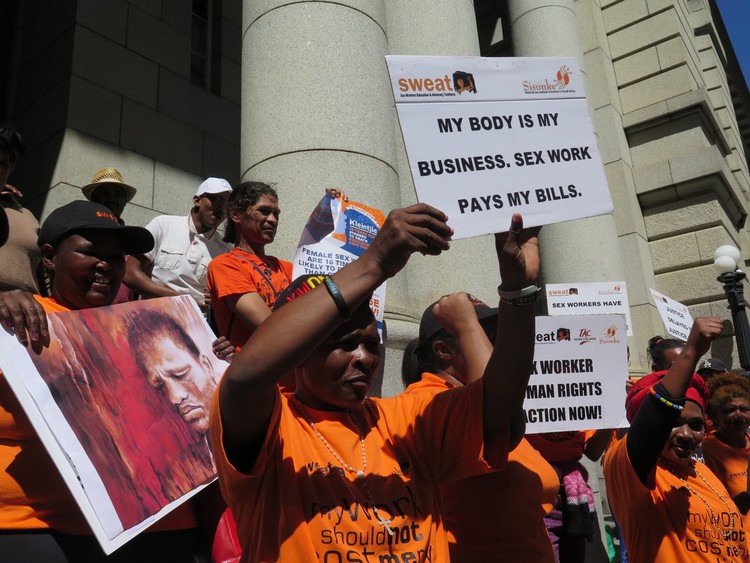Study uncovers brutal policing of sex work
Civil society and the police have begun to work together to stop the abuse
Police routinely violate the human rights of sex workers, a study on the policing of sex work in South Africa has found. Over half the sex workers surveyed said they had paid a bribe to the police. Some described repeated rapes and beatings by police.
“I fell to the ground and they kept hitting me. One of them was trying to break my leg … I was bleeding near the wrist. The police hurt my neck and I can’t turn my neck properly ever since,” a 29-year-old sex worker, told researchers.
“The police beat me around the head very hard. They were punching me and I was bleeding. They hit me so hard a tooth flew out of my mouth. I started to bleed from both ears as well as my mouth,” said another respondent, whose hearing has remained affected.
Others described routine harassment, humiliation and arbitrary imprisonment. Over 60% of those surveyed had been arrested, but almost two thirds of them never appeared in court.
The sex workers in the study commissioned by Sonke Gender Justice and the Sex Workers Education and Advocacy Taskforce (SWEAT) were between 21 and 65 years old. Most were supporting between three and nine dependents. The 120 participants were split between 57 survey participants and 63 interview participants in two provinces.
Changing police behaviour
The Positive Policing Partnership was established last year by civil society organisations as a response to the continued abuse of sex workers by police officers. SWEAT attorney Stacey-Leigh Manoek told GroundUp that SAPS (South African Police Service) “supports the broad aims” of the partnership.
Nosipho Vidima of SWEAT said the organisation had been trying to engage the police for years to find a way to work together, instead of against one another. “But there wasn’t enough research and there wasn’t a proper collaborative approach to it,” said Vidima.
She said that previously they provided sensitivity training to police officers only after offences had occurred. The Positive Policing Partnership hopes to bring about change in the police force so that these violations don’t happen in the first place.
The report suggests a number of ways that sex workers and the police could begin to have more positive engagements. These include a review of how complaints against police are managed and the creation of standard operating procedures for police officers, which guide how they police sex work.
The report also recommends that sex work be decriminalised. Sex work is currently illegal in South Africa and the South African Law Reform Commission’s 2017 report recommends for this system to continue. This is despite the ANC, as well as many global human rights organisations, including UNAIDS, WHO and Amnesty International, backing decriminalisation.
The researchers believe that decriminalisation would help to prevent police harassment and violence against sex workers. It would also reduce social exclusion which makes sex workers “more vulnerable to exploitation”.
Last year, a training manual was developed by COC Netherlands and AidsFonds for police officers to help them “provide a service that is non-marginalising and non-judgement to LGBTI people, sex workers and people who use drugs”.
The manual teaches how to treat sex workers with dignity and respect when they are either in conflict with the law or are victims of crimes. Over 400 police officers have already been trained on the contents of the manual. Positive Policing Partnership hopes to take the project forward this year and continue to work with the manual.
Manoek, who was one of its authors, said that police officers at the training sessions were “open to the different case studies of other countries, where police officers enforced the law within a human rights framework”.
Brigadier Mashadi Selepe said “the manual was well received by the members of the South African Police Service who attended the workshop. They were optimistic and committed to provide the service aligned to the recommendations and prescripts [in the manual] … Further training will be rolled out countrywide starting with Human Resource Development facilitators, Employee Health and Wellness functionaries as well as all the Client Service Centre members in all police stations.”
Selepe said, “Further consultation with all the relevant organisation including NGOs will be an ongoing process to ensure that policing of sex workers is strengthened. The Service currently has a Memorandum of Understanding with COC-Netherlands on the manual that was developed – the process will be taken forward with local NGOs.”
Support independent journalism
Donate using Payfast

Don't miss out on the latest news
We respect your privacy, and promise we won't spam you.
Next: Blade Nzimande says getting trains working is “urgent task” but provides no time frame
Previous: Losing the war on waste in filthy Port Elizabeth suburb
© 2018 GroundUp. 
This article is licensed under a Creative Commons Attribution-NoDerivatives 4.0 International License.
You may republish this article, so long as you credit the authors and GroundUp, and do not change the text. Please include a link back to the original article.

